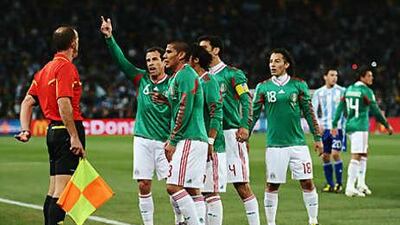JOHANNESBURG // Fifa's refusal to use technology to help decide close calls has left football isolated in major international sport, clinging to the idea that human error is somehow preferable to computer-backed truth. While other sports have embraced the use of video replays or infra-red systems to review goals and other close calls, earlier this year football's governing body ruled out the use of any such system for the foreseeable future.
The issue came into sharper focus after decisions, shown by instant replays to be incorrect, altered the balance of two World Cup second-round matches on Sunday. First, it was a shot from Frank Lampard that hit the German crossbar and bounced down well over the goal line when England, chasing a comeback, were 2-1 down. Germany, clearly rattled at the time, went on to win 4-1. Later, at Soccer City, Mexico had been enjoying the better of the game against Argentina when Carlos Tevez scored from an offside position, setting Diego Maradona's side on their way to a 3-1 victory.
Nicolas Maingot, a Fifa spokesman, was in an uncomfortable position yesterday when asked for a response. He referred reporters to recent statements from Sepp Blatter, the Fifa president, who reiterated his opposition to the use of technology after the sport's lawmaking body decided against its introduction in March. "The game must be played in the same way no matter where you are in the world," Blatter said on Fifa's website. "The simplicity and universality of the game is one of the reasons for its success. No matter which technology is applied, at the end of the day a decision will have to be taken by a human being. This being the case, why remove the responsibility from the referee to give it to someone else?"
Critics among fans, players and coaches may argue that in certain cases, Sunday's games among them, giving the responsibility to someone else would lead to a more accurate decision. Tennis and cricket are among the sports to have introduced infra-red systems to track the ball, while rugby, the NBA and American football use video replays. Not all World Cup players support the idea of using technology.
Sami Khedira, the Germany midfielder, said incorrect calls "balance out" over time. Khedira's teammate, Miroslave Klose, is among those who would like technological help. "If technological solutions are there, they should be used," Klose said. "I'm not talking about TV evidence. I'm more talking about a chip in the ball or goal-line cameras. You see it in tennis and other sports, why not football?"
Fernando Torres, the Spain striker, also would welcome change. "We're tired of asking for technological help on these kind of situations," Torres said on Spanish radio. "They can determine something as important as whether you get knocked out of a World Cup." * Reuters

